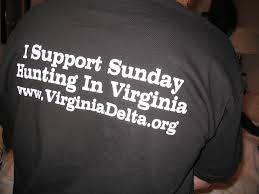
Sunday hunting has been legal in Virginia for two months; yet, as the major seasons begin to appear many questions remain on how it works.
The new law allows a landowner and his family or a person with written permission from the landowner to hunt on the landowner’s property on Sundays.
But what is meant by written permission? How do you define landowner? Does being a member of a landowner’s family include aunts, uncles and cousins? Are hunt club members considered landowners?
Here are some answers to questions that have been coming my way. The Department of Game and Inland Fisheries also is getting inquiries, and has posted answers on www.dgif.virginia.gov/hunting/hunting-on-sundays/faq.
Even though I addressed this subject a couple months ago, let’s take a look at some additional information. Thanks to Ryan J. Brown, DGIF Legislative and Policy Manager, for his input.
Q: What is meant by “written permission?”
A: The law doesn’t specify, but at the minimum a permission document should include the date when permission is granted and when it expires. It must be dated after July 1, when Sunday hunting became law. It should contain the name, address and vehicle license number of the person who is receiving permission and the signature of the person granting it.
Q: Is a special form required?
A: No, but a permission document can be downloaded from the DGIF at www.dgif.virginia.gov/hunting/regulations/privatepropertypermission.pdf. It not only contains all the information required, but also a pledge the hunter can sign stating he will abide by the wishes of the landowner and conduct himself in a sportsmanlike way.
Q: What constitutes a landowner?
A: The Attorney General’s Office has just rendered an opinion on this. When Sunday hunting legislation was approved in the 2014 General Assembly there was no question it applied to private land, like farms, and not public land, like national forest property. The measure that passed, however, did not include the word “private.” It just said “landowner.” That got some people to thinking, isn’t the national forest a landowner? Isn’t the DGIF? The Attorney General’s Office ruled that Sunday hunting is permitted only on private land, such as owned by individuals or hunt clubs or private businesses.
Q: A group of us belong to a hunt club that leases land from a private landowner. Must that landowner sign a permission document for each member?
A: Each member should have a permission document, but the club president can act as a representative of the landowner and sign for him provided he agrees.
Q: Just who are considered family members?
A: Included are spouses, children, grandchildren, spouses of children and grandchildren and the landowner’s parents. Other relatives would need written permission.
Q: The new law doesn’t permit the use of dogs when deer and bear hunting on Sundays, but what about when hunting quail, grouse, rabbits, woodcock and squirrels?
A: You can use dogs for hunting anything other than deer and bear on Sundays.
Q: For years I have had verbal permission to hunt a certain farm where the land is not posted. Now when I hunt there on Sundays, must I have written permission?
A: Yes. Verbal permission is good Monday through Saturday on land that isn’t posted, but on Sundays you must have written permission. Written permission also is required other days of the week on posted property├»┬╗┬┐, just as it is now.
Q: Say I get written permission to hunt and later want to bring my son or daughter. Must I stop by the landowner’s house for a permission document each time I bring a new person?
A: Not if the landowner allows you to act as his representative and pass on written permission to each of your hunting companions.
Q: What about land that is privately owned but managed by DGIF, such as the large holdings of Appalachian Power Co. property along Smith Mountain Lake? Is written permission required, and who grants it?
A: DGIF is studying advice from the Attorney General’s office on this and says it will have an answer shortly
Bill Cochran of The Roanoke Times
